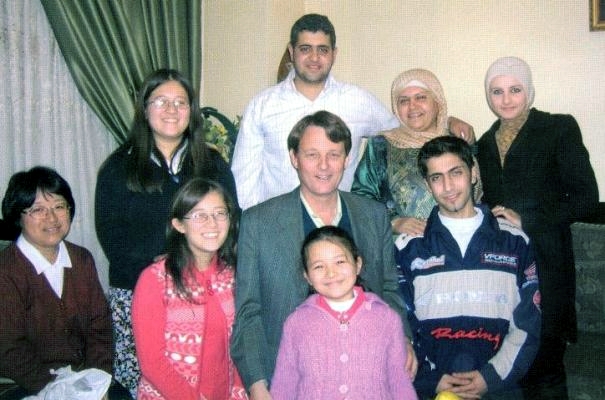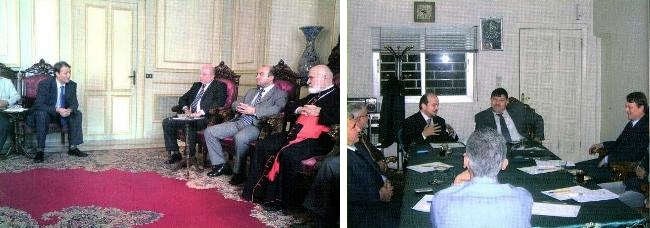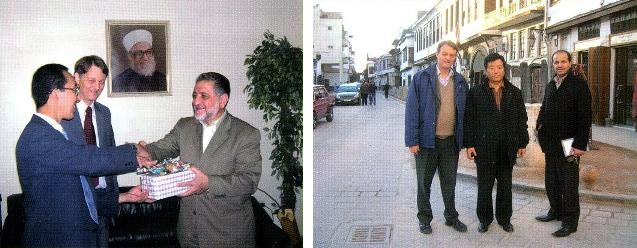![]()
The Words of the Fraser-Harris Family
|
|
The Words of the Fraser-Harris Family |

David
Fraser Harris (center), his wife Keiko (at left) and children in the
home of Feras (standing), a Palestinian man who tutored the Fraser
Harris children in Arabic. During this visit they took turns reading
excerpts from one of Father's peace messages.
As I write, Syria is in turmoil and thousands are dying. It is difficult to write calmly in such circumstances, but for the sake of history we must record our efforts to advance Heaven's providence in the nation assigned to us as the Abel national messiah family.
When the call came in 1996, it took some prayer before we decided to leave behind our Vatican (European interfaith) mission and head for Chung Pyung. Following the national messiah workshop, we took almost a year to find a suitable way to move from Rome to Damascus and to raise the funds to make that possible. We moved on August 11, 1997, which has become a special day for our family.
Much was in place to support a good beginning for us. Already the ten WFWP sisters were settled there and taking care of the early (1992) Muslim blessed couples. Both the Adam and Eve national messiahs visited Syria.
Nevertheless, we were in no doubt as to the difficulty of such a mission. When asked by the many Italian Christians who donated to support our future mission in Syria what kind of mission it was, I answered, "Not changing people's religion." When asked by members in Italy, "What are you going to do in Syria?" 1 answered with one word, "Stay," mindful of the fact that so many had been unable to stay very long. In fact, one thing that gave us strength was the very fact that the national messiah mission was supposed to continue for three generations. We quickly realized that very little would be possible in a short few years. This definitely was a family mission.
Even though we came to represent True Parents, we could not approach our challenge as missionaries. In fact, rather like Mission Butterfly' twenty years earlier, we felt we had to more or less disappear off the Unificationist map for a while. We had to build a foundation of our own, winning respect from those around us. A teaching job at an international school provided us with a way to begin -- legal residency, family income and schooling for the children. When the international school closed down after a year, I became a teacher at the American Language Center, which provided the legal and financial support for most of our time in Syria.
Over time, the respect I earned as a teacher began to open doors for us. As I talked with students and colleagues, I explained my interest and experience in interfaith work and peace projects. Students began to attend our events in Istanbul and Beirut. One student used to linger after class, wanting to talk about deeper things. We took to walking together to his bus stop twice a week. That was how he heard Divine Principle -- walking to the bus. Later he became an Arabic tutor to our children, as a favor. Feras, a Palestinian Muslim, later wrote, "At first, I knew only about Islam. I had never thought about any other religion or gotten any idea about what they believe in and how they express their faith. David is the one who introduced me to other faiths. He... led me to believe that how I view others outside of Islam is wrong. I know a lot of people propagating hatred for other religions, but David is different: he is the man that I know who spreads love not just among his fellows in their beliefs but with others as well."
In late 2001, I was sharing with Feras about the need to find a good religious leader to attend an international conference. He said he would take me to meet a sheikh "who teaches that we should only have one wife." I took with me the report on the Jakarta conference. When the sheikh saw it, he said, "Kaufmann -- I know that name." I became very worried. Just a few months before, Frank Kaufmann had explained at an Istanbul conference how one particular Arab event had almost collapsed just because of his name, which sounds Jewish. Then the sheikh continued, "I met him at the New Yorker Hotel." As we began to unravel the story, we discovered that this sheikh had been with the Grand Mufti of Syria when he brought a group of followers to study the Principle at the New Yorker in 1991. He had later married the granddaughter of the mufti and become a respected sheikh in his own right. Dr. Mohammad Habash was delighted to accept the invitation to Seoul for the 2002 celebration of True Parents' birthday. When True Father heard that a Syrian was present, he immediately asked about the Grand Mufti, and Taj Hamad was asked to visit Syria to meet him again.

Left:
David Fraser Harris explains the work of UPF to Cardinal Nasrallah
Butros Sfeir, Patriarch of the Maronite Catholic Church in Lebanon
(1986-2011); Right: Dr. Mohammad Habash speaks at an event at his
Islamic Studies Center in Damascus, in 2006, at which a peace message
of Father's was read (in Arabic) by Alfred and Heather Fraser Harris,
seated here next to their father.
Life in Syria definitely had its unique challenges. In my early days there, teachers used to say that in a class of sixteen you could guarantee that two were government informers. I know of several teachers who were forced to leave the country because they openly spoke as evangelical Christians. On more than one occasion, when I visited Dr. Habash's office, he would tell me that the person who was just leaving was from the secret police. I also heard the same when I visited my travel agent. I had no difficulty with this. I remembered True Father saying in East Garden, "1 am sure there are people from the CIA and the KGB here. I hope they listen carefully." From later reports, it appears that at least the KGB did. I hoped the Syrians would, too!
In 2005, as the Inter-religious Peace Sports Festival (IPSF) was developing, I received a call from a Syrian Christian living in Germany. He had read about IPSF online and was coming to Syria for Easter. We arranged to meet, and he became keen to find Syrian participants for the project. Later he set up an appointment for me at a Damascus office. At the request of the lady in charge I brought an IPSF leaflet with me. After a fifteen-minute meeting, in which the lady spoke once and her "medical advisor" took over, repeating several times that Syria "does not need such interfaith work," I realized that progress was unlikely. Two days later my wife received a call: "This is the police. Your husband's passport is out of order." When the man came around a day later to interview me, he put a copy of the leaflet on the table. "You are not allowed to hand these out," he said. I explained that I had brought it because I had been asked to. A year later, I received a follow-up call, checking whether we had sent any Syrians to the project. In 2006, Play Football Make Peace had a successful regional tournament in Amman. The Syrian school team was on the bus ready to leave when they received orders from the government that it would be a security risk for them to participate.
The government was evidently unhappy with any effective foreign influence. The successful international school where I taught for my first year was closed down by the government amid rumors and recriminations. One such rumor had it that there was Middle School teacher called David (a suspiciously Jewish-sounding name) who was teaching propaganda in a back room. Another rumor (not about the school) claimed that senior TV personalities had been hanged in the square near our house for passing information to the enemy. In such a climate, unverified rumors have a life of their own.
Following Dr. Habash's attendance in Seoul, I was asked to take on the role of regional secretary-general for IIFWE I replied that I could not take a national position, but a regional one would be possible. I was thus able to actively support programs and activities across the region, especially in Jordan and Lebanon. Syria was able to send participants to many of these programs. Dr. Habash himself became a member of the Syrian parliament'- (2003-2011). He also became a member of UPF's Global Peace Council and assisted in key projects. One unsuccessful one was the translation of World Scripture into Arabic. Less moderate opponents of Dr. Habash spread rumors that World Scripture was intended to supplant the Koran, which caused most of the student translators to back out of the project for fear of damaging their reputation. More successful was the translation of True Father's autobiography into Arabic. While the actual translation was done in Egypt, Japan, Korea and Sudan, the final editing was done by a Syrian lady (living in Hama) in the early months of the Syrian uprising.
The family element of the mission has remained constant. Early on, I found inspiration in the approach of the sixteenth century Jesuit, Matteo Ricci, to his mission in China. His success in becoming respected in the Chinese culture inspired me. My hope was that our family would be able to do something similar in Syria over time. Now we are all outside Syria, but Syria is in our hearts and it will be difficult to stop our children from returning there. All five of them speak Arabic, four as native speakers. All of them keep in touch with their friends there, especially in these troubled times. WFWP's recent Geneva conference on the Middle East included five second-generation members, one of whom was one of our daughters. The same daughter took responsibility for translating fifty pages of True Father's autobiography. Many providential events were held on a family level in our home.

Left:
The Eve national messiah to Syria presents a gift to Mahmoud Kuftaro,
son of the late Grand Mufti Ahmed Kuftaro (photo on the wall) who was
active in interfaith relations; he and True Father met several times;
Right: On Straight Street in Damascus, where Saul, later St. Paul,
stayed and had his sight restored (Acts 9: 11-17) after his spiritual
experience on the road to the city.
Looking back, we have to testify to the help received from Heaven, both in getting started and in weathering the many storms we faced. The move to Syria was unbelievably smooth.
Since the school I was going to work for was sponsored by the EU office in Damascus, we received VIP treatment on arrival, being ushered through customs. The many boxes we shipped from Rome were delivered directly to the EU office. The experience of meeting Dr. Habash showed me that True Parents really have walked the path ahead of us. When the international school was closed, a new lifeline opened in the form of the American Language center. Among other things, this -16 made it possible for me to support my family on half a week's work and then devote a lot of time to UPF work throughout the region. Riots (in protest against the Iraq no-fly zone) in 1998 could easily have destroyed the language center, eliminating our way of staying there, but the building was spared. Faced with the Syrian government's closure of all American institutions in late 2008, we were ordered to leave the country. With two children in twelfth grade schooling, we felt that we needed to find a way to stay. A Christian member of the parliament was moved to write to the minister of the interior on our behalf, impressed by our desire to stay in Syria against all odds. Eventually I managed to find work teaching at one of Syria's new private universities. When the university offered to arrange a visa for me, I advised against it, saying that my name was on the blacklist and it would only cause problems. A year and a half later, the ministry ordered the university to fire me, but by then the language center had reopened and there was no objection to my resuming teaching there.
Even at the end, Heaven's help was there. As we saw the situation deteriorating in 2011, it gradually became clearer how much worse it was going to get. In late November we finally came to the conclusion that we had to leave, and informed the language center that we would leave at the end of the term, taking up an offer for evacuation that had been available since April. On December 22, the day the term ended, we were informed that the school would be closed. Some teachers protested that it was not necessary, while others remarked that our decision had been prescient. The next day the first bombs went off in central Damascus. When we finally left on January 9, 2012, a security firm monitored our safe exit every step of the way, even calling us at Amman airport and after our arrival in Scotland. Our son stayed on in Syria until August 2012, hoping to be able to complete his studies there. When he finally left, our family had spent fifteen years in Syria. None of us feels as if our time there has finished.